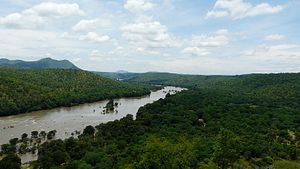In December 2015, when the worst floods in decades wrecked the city of Chennai in the state of Tamil Nadu in India, the city of Bangalore in the neighboring state of Karnataka was among the first to lend a hand with relief and rehabilitation efforts. Now, in September 2016, when both states are facing a severe water shortfall from the expected monsoons, the situation has been reversed.
Earlier this month, the Supreme Court of India passed a directive to Karnataka regarding its water-sharing agreement with Tamil Nadu. The river Cauvery, which originates in Karnataka, but flows significantly through Tamil Nadu, has been a bone of contention and intense rivalry between the two states. The recent verdict directed Karnataka to release 15,000 cusecs of water per day to Tamil Nadu for 10 days. Karnataka petitioned against the verdict, but began putting it into effect. As a result, people in the state rose up in protest.
In the district of Mandya, farmers in particular showed their anger through protests and demonstrations. Soon other districts caught up – with dam seizures and bridge blockades. Even after some arrests, the protests did not abate. Eventually a whole highway was blocked and 700 buses had to be pulled off the roads. While farmers hit the streets, mobs literally stopped buses faring down roads.
Things escalated when property owned by Tamil people began to come under attack, starting with stones pelted at a hotels, vehicles, and even a bank. The Cauvery Hitarakshana Samiti (Cauvery protection committee) called for a ‘bandh’ or a complete strike earlier this week. Violence escalated in Bangalore as trucks and buses were burnt. Finally, a curfew was imposed upon the city under Section 144 and buses between Bangalore and Chennai were all pulled off the road.
Tamil Nadu Chief Minister J. Jayalalithaa wrote to Karnataka Chief Minister Siddaramaiah with a plea seeking protection for Tamil people in the state. Siddaramaiah in turn is attempting to both fulfill the Supreme Court directive and moderate panic stemming from water scarcity in his own state. He has declared that the task is next to impossible, but could not be evaded. He has attempted to move the directive to reduce the amount of water to be released, given the shortage faced by his own state. The final hearing on the original petition filed by Karnataka is scheduled for October 10.
This conflict has a 150-year history and attempts at resolution have dated back to colonial India. However, in 1991, things came to head in the worst instances of mob violence that the two states had seen. The Cauvery Water Tribunal set up by the government gave specific water sharing orders to the states. The riots in Karnataka, rebelling against the verdict, ravaged through the cities of Mysore and Bangalore culminating in thousands of Tamil people fleeing from Karnataka.
Each time there is a fluctuation in the monsoon, the scars of this crisis resurface. Chennai mobs launched retaliations to the most recent spat of violence – vandalizing a hotel of Karnataka origin and stopping tourist vehicles. Earlier on Wednesday, however, as the police took a firmer hand in both states, the violence dissipated and curfew was removed from Bangalore.
Riots like these push around the worst identity wars as well. As water is such a touchy subject in the drier and more humid southern states of India, any existing camaraderie is quickly shed. News channels as well as celebrities are dragged into the fray, sensationalizing reactions and calling for assertion of linguistic identity. Tamil movies were pulled out of some theaters for instance, and some actors were boycotted for not officially declaring solidarity with the farmers’ protests. Unfortunately, at the same time, the water levels of the river were not exceptionally high to begin with and groundwater levels are dropping.
Sustainable water sharing agreements are just a starting point and are hard enough to implement when identity politics collide with the panic of water scarcity in rain-fed agricultural states. In the long run, as Prime Minister Narendra Modi calls for peace between the warring states, talk of resolution needs to address the ecological components of this problem.

































